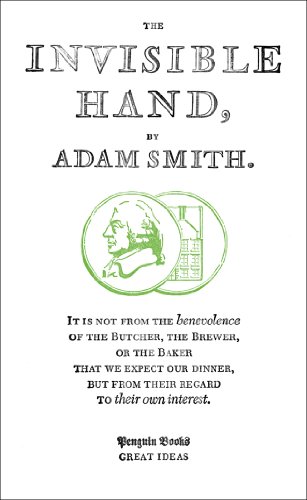Newly released
This book is new and will be uploaded as soon as it becomes available to us and if we secure the necessary publishing rights.

The Invisible Hand Book PDF
(0)
Author:
Adam SmithNumber Of Reads:
76
Language:
English
Category:
Social sciencesSection:
Pages:
114
Quality:
excellent
Views:
1039
Quate
Review
Save
Share
Book Description
Adam Smith’s landmark treatise on the free market paved the way for modern capitalism, arguing that competition is the engine of a productive society, and that self-interest will eventually come to enrich the whole community, as if by an ‘invisible hand’.
Throughout history, some books have changed the world. They have transformed the way we see ourselves – and each other. They have inspired debate, dissent, war and revolution. They have enlightened, outraged, provoked and comforted. They have enriched lives – and destroyed them. Now Penguin brings you the works of the great thinkers, pioneers, radicals and visionaries whose ideas shook civilization and helped make us who we are.
Adam Smith
Adam Smith is a Scottish moral philosopher and economist. He is considered the founder of classical economics and a pioneer of political economy. He is best known for his two classic books: The Theory of Moral Sentiments (1759) and An Inquiry into the Nature and Causes of the Wealth of Nations (1776). It is one of his most important effects, and the first work dealing with modern economics, and was known for short, as “The Wealth of Nations.” He called for promoting individual initiative, competition, and freedom of trade, as the best way to achieve the greatest amount of wealth and happiness. Smith is considered the father of modern economics, and he is still considered one of the most influential economic thinkers in today's economics. In 2009, Smith was named among the "Greatest Scots" of all time, in a vote on a Scottish television channel. Smith studied social philosophy at the University of Glasgow and at Balliol College, Oxford, and after graduating gave a successful series of public lectures at the University of Edinburgh. He then obtained a professorship in Glasgow teaching moral philosophy, during which time he wrote and published The Theory of Moral Sentiments. Smith later worked as a tutor, which allowed him to travel around Europe, where he met some of the great thinkers of his day. Smith then returned to his country, and spent about ten years working on his book The Wealth of Nations, which was then published in 1776. Smith then died in 1790 at the age of 67.
Book Currently Unavailable
This book is currently unavailable for publication. We obtained it under a Creative Commons license, but the author or publisher has not granted permission to publish it.
Rate Now
5 Stars
4 Stars
3 Stars
2 Stars
1 Stars
The Invisible Hand Quotes
Top Rated
Latest
Quate
Be the first to leave a quote and earn 10 points
instead of 3
Comments
Be the first to leave a comment and earn 5 points
instead of 3